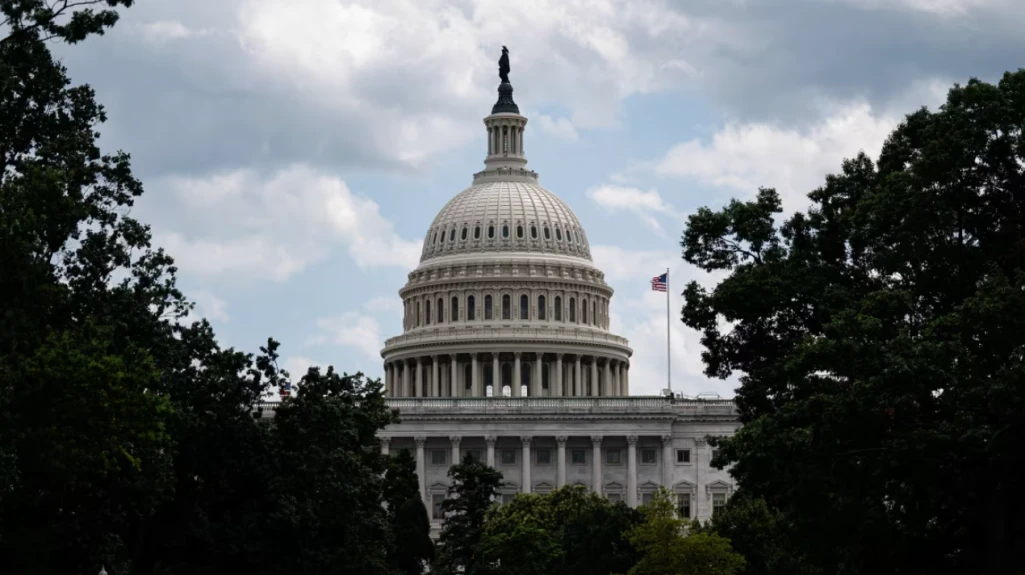
House Republicans gave the final stamp of approval early
Friday morning to a package of $9 billion in spending cuts to foreign aid and
public broadcasting, handing a win to President Donald
Trump.
Congress passed the package — which is part of Trump’s
cost-cutting Department of Government Efficiency efforts — under an obscure
presidential budget law used to circumvent the Senate filibuster. The measure
will now head to the president to be signed into law.
Trump is the first president in roughly 30 years to
successfully use
the maneuver, in a show of deference to the White House from the
legislative branch – which is specifically given the power of the purse in the
US Constitution.
Roughly $8 billion will be taken from congressionally
approved foreign aid programs as part of the White House’s efforts to dismantle
the US Agency for International Development. Another $1.1 billion comes from
the Corporation for Public Broadcasting, which helps fund NPR and PBS.
The final tally was 216-213, with GOP Reps. Mike Turner and
Brian Fitzpatrick the only Republicans to vote against the package.
The spending cuts package, which codifies some of DOGE’s
cuts into law, was a key priority for Trump and conservatives who have long
railed against ballooning federal spending.
Ahead of final passage, however, the package ran into
problems in the narrowly divided House, as some of the same members demanded a
separate and unrelated promise from GOP leadership calling
for more transparency on the Jeffrey Epstein files.
The issue of more transparency over the Epstein case has
percolated for days on Capitol Hill, placing an awkward wedge between Trump and
some of his most steadfast supporters in the House GOP. Speaker
Mike Johnson and his leadership team spent hours on Thursday afternoon with
members of the House Rules Committee negotiating over the path forward.
Ultimately, the committee voted Thursday night to advance
the DOGE cuts package as well as a
non-binding resolution that calls for the release of additional
Jeffrey Epstein files following calls from a number of Republicans for more
transparency surrounding the case. There is nothing that would compel this to
the floor, however.
After the House passed the DOGE cuts package, Trump, Johnson
and congressional Republicans were quick to tout the move. On Truth Social,
Trump said, “THIS IS BIG!!!”
The speaker said he was “delighted” to move the DOGE cuts
package to the president’s desk.
“We’re going to downsize the scope of government. Government
is too large. It does too many things, and it does almost nothing well. We
believe in a limited government that’s accountable and efficient and effective
for the people, and we’re going to continue to demonstrate that through our
actions here on the floor,” he said.
But Johnson would not commit to bringing the non-binding
Epstein resolution to the floor.
“We will see how all of this develops. We’re in line with
the White House, there’s no daylight between us,” he said.
The spending cuts package is $400 million less than the
initial package the House passed after Senators
rejected a plan to cut PEPFAR, a global program to combat AIDS. But
conservatives still voted for the package when it came up for its second vote
in the House arguing it contained significant spending cuts in other areas of
global health.
“It’s disappointing that we’re, you know, $37 trillion in
debt. This, to me, was low hanging fruit. We saw how DOGE exposed a lot of this
misuse of funds. It’s disappointing that the
Senate took it out,” Rep. Eric Burlison of Missouri said.
“It’s better than
nothing. So I think that at least we’re able to make
some spending reductions.”
Passage of the bill, however, now raises questions about how
and whether Democrats and Republicans will be able to work together to keep the
government funded past the September 30 deadline. Democratic Senate Leader
Chuck Schumer argued the process has cast doubt on whether Democrats can work
in good faith with Republican lawmakers who could agree to a spending deal now
and pull future funding later.
Schumer said that he does not “have much faith” in Senate
Majority Leader John Thune’s insistence that Senate Republicans will approach
government funding in a bipartisan way, after White House Office of Management
and Budget Director Russ Vought said earlier on Thursday that the
appropriations process should be “less bipartisan.”
“Every time they have tried to resist Trump and Vought, they
have folded – as recently as last night. I don’t have much faith in that,”
Schumer told CNN.
GOP appropriators argue that the rescissions package
shouldn’t have any impact on those future spending talks and if it does, that
is Democrats’ own choice.
“It’s up to them,” House Appropriations Chairman Tom Cole said.